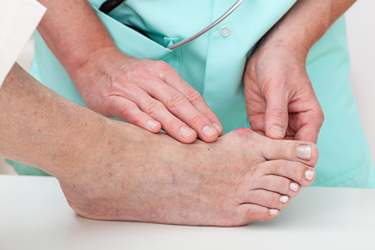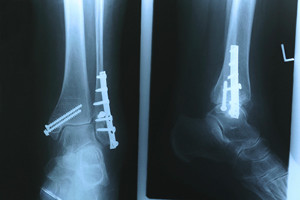Items filtered by date: January 2022
Who Needs an ABI Test?
 An Ankle-Brachial Index (ABI) test is a screening tool that is used to assess circulation in the lower limbs. During an ABI test, the doctor takes your blood pressure at various points along your arms and lower legs and compares the numbers to determine your risk of having full or partial blockages in the blood flow of your lower limbs. Not everyone needs an ABI test. They are typically done for people who are at risk of peripheral artery disease, a condition characterized by poor circulation in the extremities. People who are at risk of having peripheral artery disease include those with a history of smoking, high blood pressure, high cholesterol, diabetes, and atherosclerosis, as well as older adults and people who have a family history of peripheral artery disease. To learn more, please consult with a podiatrist.
An Ankle-Brachial Index (ABI) test is a screening tool that is used to assess circulation in the lower limbs. During an ABI test, the doctor takes your blood pressure at various points along your arms and lower legs and compares the numbers to determine your risk of having full or partial blockages in the blood flow of your lower limbs. Not everyone needs an ABI test. They are typically done for people who are at risk of peripheral artery disease, a condition characterized by poor circulation in the extremities. People who are at risk of having peripheral artery disease include those with a history of smoking, high blood pressure, high cholesterol, diabetes, and atherosclerosis, as well as older adults and people who have a family history of peripheral artery disease. To learn more, please consult with a podiatrist.
Vascular testing plays an important part in diagnosing disease like peripheral artery disease. If you have symptoms of peripheral artery disease, or diabetes, consult with the foot specialists from Podiatry Associates of Belleville. Our doctors will assess your condition and provide you with quality foot and ankle treatment.
What Is Vascular Testing?
Vascular testing checks for how well blood circulation is in the veins and arteries. This is most often done to determine and treat a patient for peripheral artery disease (PAD), stroke, and aneurysms. Podiatrists utilize vascular testing when a patient has symptoms of PAD or if they believe they might. If a patient has diabetes, a podiatrist may determine a vascular test to be prudent to check for poor blood circulation.
How Is it Conducted?
Most forms of vascular testing are non-invasive. Podiatrists will first conduct a visual inspection for any wounds, discoloration, and any abnormal signs prior to a vascular test.
The most common tests include:
- Ankle-Brachial Index (ABI) examination
- Doppler examination
- Pedal pulses
These tests are safe, painless, and easy to do. Once finished, the podiatrist can then provide a diagnosis and the best course for treatment.
If you have any questions, please feel free to contact our office located in Belleville, NJ . We offer the newest diagnostic and treatment technologies for all your foot care needs.
Do Your Hiking Shoes Fit Correctly?
 Having shoes that fit correctly when hiking is very important because of the stress that is put on your feet. It is important to make sure that the hiking shoes are snug, but not too tight, and that the toes have room to wiggle. There are a few things that can be done in order to make sure hiking boots fit correctly when purchasing them. Because your feet tend to swell during the day, it’s a good idea to try on shoes either toward the end of the day or right after you exercise. Wearing the same socks and orthotics that will be worn with the shoes while hiking is also key in order to make sure you understand how the shoes will fit under those conditions. Shoes should also have a proper width to give the toes enough space, and there should also be enough space between the edge of the toes and the edge of the shoe. If you are unsure that your shoes fit properly, it’s suggested that you consult with a podiatrist who can examine your feet and offer expert advice.
Having shoes that fit correctly when hiking is very important because of the stress that is put on your feet. It is important to make sure that the hiking shoes are snug, but not too tight, and that the toes have room to wiggle. There are a few things that can be done in order to make sure hiking boots fit correctly when purchasing them. Because your feet tend to swell during the day, it’s a good idea to try on shoes either toward the end of the day or right after you exercise. Wearing the same socks and orthotics that will be worn with the shoes while hiking is also key in order to make sure you understand how the shoes will fit under those conditions. Shoes should also have a proper width to give the toes enough space, and there should also be enough space between the edge of the toes and the edge of the shoe. If you are unsure that your shoes fit properly, it’s suggested that you consult with a podiatrist who can examine your feet and offer expert advice.
It is important to find shoes that fit you properly in order to avoid a variety of different foot problems. For more information about treatment, contact the foot specialists from Podiatry Associates of Belleville. Our doctors will treat your foot and ankle needs.
Proper Shoe Fitting
Shoes have many different functions. They cushion our body weight, protect our feet, and allow us to safely play sports. You should always make sure that the shoes you wear fit you properly in order to avoid injuries and deformities such as: bunions, corns, calluses, hammertoes, plantar fasciitis, stress fractures, and more. It is important to note that although a certain pair of shoes might be a great fit for someone else, that doesn’t mean they will be a great fit for you. This is why you should always try on shoes before buying them to make sure they are worth the investment. Typically, shoes need to be replaced ever six months to one year of regular use.
Tips for Proper Shoe Fitting
- Select a shoe that is shaped like your foot
- Don’t buy shoes that fit too tight, expecting them to stretch to fit
- Make sure there is enough space (3/8” to ½”) for your longest toe at the end of each shoe when you are standing up
- Walk in the shoes to make sure they fit and feel right
- Don’t select shoes by the size marked inside the shoe, but by how the shoe fits your foot
The shoes you buy should always feel as good as they look. Shoes that fit properly will last longer, feel better, and improve your way of life each day.
If you have any questions, please feel free to contact our office located in Belleville, NJ . We offer the newest diagnostic and treatment technologies for all your foot care needs.
Bunions: An Acquired Yet Correctable Deformity
A bunion is a painful deformity that occurs over time, causing a bony protrusion at the base of the big toe joint. Aside from being unsightly, a bunion can become quite painful and inflamed. Bunions are often caused by high heels that force the foot forward, or footwear that is pointy, tight at the toes, or puts pressure on the big toe joint. Heredity and diseases that affect the joints can increase the risk of a bunion developing. If you have a bunion, it’s suggested that you make an appointment with a podiatrist. There are a variety of methods that can be used to correct the deformity and restore the natural alignment of your big toe. After examining and assessing the bunion, your podiatrist will explain their findings and go over your treatment options.
If you are suffering from bunions, contact the foot specialists of Podiatry Associates of Belleville. Our doctors can provide the care you need to keep you pain-free and on your feet.
What Is a Bunion?
A bunion is formed of swollen tissue or an enlargement of boney growth, usually located at the base joint of the toe that connects to the foot. The swelling occurs due to the bones in the big toe shifting inward, which impacts the other toes of the foot. This causes the area around the base of the big toe to become inflamed and painful.
Why Do Bunions Form?
Genetics – Susceptibility to bunions are often hereditary
Stress on the feet – Poorly fitted and uncomfortable footwear that places stress on feet, such as heels, can worsen existing bunions
How Are Bunions Diagnosed?
Doctors often perform two tests – blood tests and x-rays – when trying to diagnose bunions, especially in the early stages of development. Blood tests help determine if the foot pain is being caused by something else, such as arthritis, while x-rays provide a clear picture of your bone structure to your doctor.
How Are Bunions Treated?
- Refrain from wearing heels or similar shoes that cause discomfort
- Select wider shoes that can provide more comfort and reduce pain
- Anti-inflammatory and pain management drugs
- Orthotics or foot inserts
- Surgery
If you have any questions, please feel free to contact our office located in Belleville, NJ . We offer the newest diagnostic and treatment technologies for all your foot care needs.
It's Time for Beautiful Feet
How Stress Fractures Develop and Differ From Breaks
When someone engages in regular physical activity, such as running, jumping, or other repetitive movements, this can stress the bones in the feet and lower legs. Over time, these repetitive movements and stress can lead to the development of tiny hairline cracks in the bones. These stress fractures can also develop when the type, duration, intensity, or frequency of physical activity occurs. Unlike more severe breaks due to acute trauma, which can cause immediate and intense pain, the pain from stress fractures can be duller and develop more gradually. Ballet dancers and athletes engaging in high impact sports such as basketball, tennis, track and field, soccer, and hockey are at greater risk of developing these microscopic fissures in their foot or lower leg bones. Along with a dull pain which intensifies during physical activity, there may be swelling, tenderness and bruising in the affected area. A podiatrist should be consulted if there is any pain in the feet or lower legs. They will perform an exam, test sensitivity to pressure in the affected area, and may use X-rays or bone scans to properly diagnose the issue. This professional assessment and care will not only help heal the stress fracture, but also prevent it from becoming a more severe break.
Activities where too much pressure is put on the feet can cause stress fractures. To learn more, contact the foot specialists from Podiatry Associates of Belleville. Our doctors can provide the care you need to keep your pain free and on your feet.
Dealing with Stress Fractures of the Foot and Ankle
Stress fractures occur in the foot and ankle when muscles in these areas weaken from too much or too little use. The feet and ankles then lose support when walking or running from the impact of the ground. Since there is no protection, the bones receive the full impact of each step. Stress on the feet can cause cracks to form in the bones, thus creating stress fractures.
What Are Stress Fractures?
Stress fractures occur frequently in individuals whose daily activities cause great impact on the feet and ankles. Stress factors are most common among:
- Runners
- People affected with Osteoporosis
- Tennis or basketball players
- Gymnasts
- High impact workouts
Symptoms
Pain from the fractures occur in the area of the fractures and can be constant or intermittent. It will often cause sharp or dull pain with swelling and tenderness. Engaging in any kind of activity which involves high impact will aggravate pain.
If you have any questions please feel free to contact our office located in Belleville, NJ . We offer the newest diagnostic and treatment technologies for all your foot and ankle needs.


